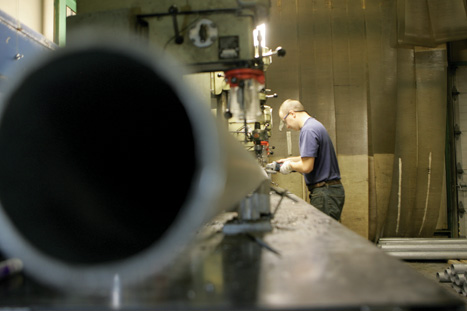The massive levels of growth that are about to hit the UK renewables industry could be just what the country needs to help solve its environmental and financial problems. But what remains uncertain is whether the UK has the right engineering skills to underpin this change.
According to Daniel Borisewitz, policy manager at industry body Scottish Renewables, the answer is a resounding yes. ’There is a great level of similarity between the necessary skills for many renewables and traditional energy sectors,’ he said. ’Some are more obvious than others, such as the link between offshore wind and oil and gas.’

But while there are clear parallels between the skills required in renewables and other engineering sectors, many believe that far more needs to be done to develop a renewable energy engineering workforce. The 2011 UK Renewable Energy Roadmap sets out plans to increase development of renewables technology to deliver 234TWh, or 15 per cent of projected energy consumption, by 2020.
As a result, the UK renewables industry will need to employ more than half a million people by 2020 - a quarter of a million more than it does today. The biggest challenge will be in onshore and offshore wind. According to the recent Working for a Green Britain report, jointly commissioned by Energy and Utility Skills (EU Skills) and RenewableUK, an increase from 11,000 direct employees in the wind industry in 2010 to 55,000 direct employees will be needed by 2020.
Planned increases in the usage of renewables mean the industry will need to employ half a million people by 2020
In offshore wind, detailed plans have already been set out on installation. As announced in the Round 3 applications to the Crown Estate, the UK plans to install an ambitious 7,000 offshore wind turbines by 2020. The timing of construction during this decade, however, is less clear.
Rob Moore, operations manager of low carbon at EU Skills, claims investors are still waiting for messages from the government on the Renewable Obligation Certificates and tariffs to be applied to offshore wind before going ahead with plans. ’We have a fairly good view of the end point in eight years’ time but not on how we will get there,’ he said.
This lack of clarity, alongside the recession, has taken its toll on the skills programme of companies who are reluctant to increase their training budgets, claims Tim Balcon, chief executive at EU Skills. But with pressure mounting on recruiting the right people, industry bodies and the government are now ramping up efforts to address the issue, and some companies are following their example.
On 6 October RenewableUK announced the creation of the Renewables Training Network, designed to tackle renewable energy skills gaps. Businesses in the sector have pledged the equivalent of £600,000 of support for the £1.2m project. The UK Commission for Employment and Skills has matched this with £580,000 of funding from the Growth and Innovation Fund.
“Renewable energy is a real growth area and potentially could place the UK as a world leader. Engineers will be the ones leading this”
ROB MOORE, EU SKILLS
A further initiative, which was announced in August, will see universities and industry provide training for up to 50 engineering students as part of a new £6.5m Industrial Doctorate Centre in Offshore Renewable Energy. From next year, students will have the opportunity to start renewable energy technology courses provided by Edinburgh, Strathclyde and Exeter universities.

Other universities are also adjusting their teaching programme. ’Going back six years to when I graduated, courses were very much tailored for moving into the oil and gas sector. However due to my involvement with various universities I have noticed a significant shift where renewable technologies feature significantly more than they previously had in the core syllabus,’ said Borisewitz.
Moore added that while training students is important to the industry, we shouldn’t forget about the wealth of talent already in the workforce. Like Borisewitz, he believes traditional engineering roles have a wide range of skills that can be used in areas such as construction, installation, commissioning, operations and maintenance. There will also be opportunities in supply-chain roles, such as subsea cable laying and repair and infrastructure upgrades.
’The main differences will be in the context in which the competencies are applied,’ he said. ’For instance, the space restrictions within a wind turbine, the transfers between structures, the limits on the number of staff able to work simultaneously and the dimensions of the cables are all subtle but significant differences when working in offshore wind.’
EU Skills is currently analysing the ’transition training’ requirements for the wind industry. It hopes to develop transition training that will range from half-day familiarisation courses to much longer practical training programmes. It is keen to highlight the growing number of exciting opportunities that can be offered to both new and experienced engineers in this field.
’An engineer who gains practical experience in renewable energy is going to be in demand, in whatever area of engineering they specialise,’ said Moore. ’This is a real growth area and potentially could place the UK as a world leader. If the opportunity is taken, engineers will be the ones leading this.’
employer focus
National Grid
The energy giant is looking for both new and experienced engineersWith around a quarter of the UK’s existing power plants due to close by 2023 and a total of 64.1GW of new generating capacity - including 35.8GW of renewables - due by 2020, the UK’s energy landscape is going through a period of huge change.
National Grid, which will play a vital role in connecting this new generating capacity, is already in the midst of a programme of replacement and renewal and expects to have hundreds of vacancies over the next few years.
’It’s a challenging time to be in the industry and the next 10 years promises to be a very exciting time,’ said Paula Sprayson, head of resourcing. ’New recruits will have a fantastic opportunity to work with the latest technology and ensure we have energy networks that meet the future challenges.’
The energy infrastructure giant currently has a variety of vacancies across its business for electrical, civil, mechanical, project and site engineers.
’Typical roles will be involved in maintenance of our assets (for example, substations), system control jobs in our control rooms plus many aspects of the project life cycle from designing the system, managing the construction of the networks to commissioning the kit into use,’ added Sprayson.
While many of the current roles require project management or site experience and a strong technical background, the organisation is keen to tap into the transferable skills that exist in the construction, rail, aviation, automotive and military sectors.
What’s more, there are plenty of opportunities for engineers nearer the start of their careers. ’You don’t have to be an experienced engineer to join us,’ said Sprayson, ’we also have a range of development programmes designed to grow our own talent. These include an advanced apprenticeship programme, an engineer training programme and graduate development programmes.’
As well as providing comprehensive and flexible rewards and benefits, Sprayson added that National Grid is passionate about giving its employees opportunities to develop, and not just through training and further education.
’Once you get your foot in the door you will be exposed to a wide range of opportunities to develop your career,’ she said.




Nanogenerator consumes CO2 to generate electricity
Whoopee, they've solved how to keep a light on but not a lot else.